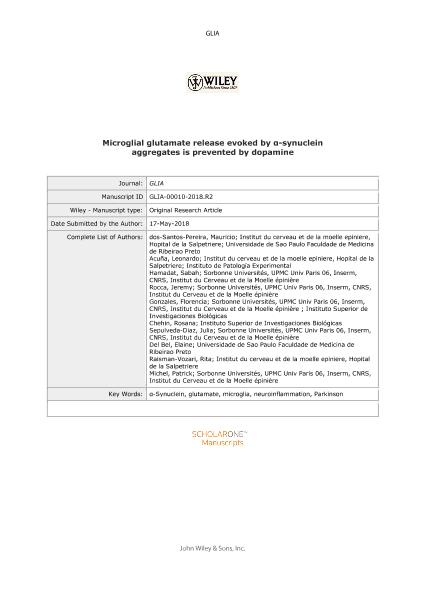Artículo
Microglial glutamate release evoked by α-synuclein aggregates is prevented by dopamine
dos Santos Pereira, Mauricio; Acuña, Leonardo ; Hamadat, Sabah; Rocca, Jeremy; González Lizarraga, Maria Florencia
; Hamadat, Sabah; Rocca, Jeremy; González Lizarraga, Maria Florencia ; Chehín, Rosana; Sepulveda Diaz, Julia; Del Bel, Elaine; Raisman Vozari, Rita; Michel, Patrick P.
; Chehín, Rosana; Sepulveda Diaz, Julia; Del Bel, Elaine; Raisman Vozari, Rita; Michel, Patrick P.
 ; Hamadat, Sabah; Rocca, Jeremy; González Lizarraga, Maria Florencia
; Hamadat, Sabah; Rocca, Jeremy; González Lizarraga, Maria Florencia ; Chehín, Rosana; Sepulveda Diaz, Julia; Del Bel, Elaine; Raisman Vozari, Rita; Michel, Patrick P.
; Chehín, Rosana; Sepulveda Diaz, Julia; Del Bel, Elaine; Raisman Vozari, Rita; Michel, Patrick P.
Fecha de publicación:
11/2018
Editorial:
Wiley-liss, div John Wiley & Sons Inc.
Revista:
Glia
ISSN:
0894-1491
Idioma:
Inglés
Tipo de recurso:
Artículo publicado
Clasificación temática:
Resumen
When activated, microglial cells have the potential not only to secrete typical proinflammatory mediators but also to release the neurotransmitter glutamate in amounts that may promote excitotoxicity. Here, we wished to determine the potential of the Parkinson's disease (PD) protein α-Synuclein (αS) to stimulate glutamate release using cultures of purified microglial cells. We established that glutamate release was robustly increased when microglial cultures were treated with fibrillary aggregates of αS but not with the native monomeric protein. Promotion of microglial glutamate release by αS aggregates (αSa) required concomitant engagement of TLR2 and P2X7 receptors. Downstream to cell surface receptors, the release process was mediated by activation of a signaling cascade sequentially involving phosphoinositide 3-kinase (PI3K) and NADPH oxidase, a reactive oxygen species-producing enzyme. Inhibition of the Xc- antiporter, a plasma membrane exchange system that imports extracellular Lcystine and exports intracellular glutamate, prevented the release of glutamate induced by αSa, indicating that system Xc- was the final effector element in the release process downstream to NADPH oxidase activation. Of interest, the stimulation of glutamate release by αSa was abrogated by dopamine through an antioxidant effect requiring D1 dopamine receptor activation and PI3K inhibition. Altogether, present data suggest that the activation of microglial cells by αSa may possibly result in a toxic build-up of extracellular glutamate contributing to excitotoxic stress in PD. The deficit in dopamine that characterizes this disorder may further aggravate this process in a vicious circle mechanism.
Palabras clave:
GLUTAMATE
,
MICROGLIA
,
NEUROINFLAMMATION
,
PARKINSON
,
Α-SYNUCLEIN
Archivos asociados
Licencia
Identificadores
Colecciones
Articulos(INSIBIO)
Articulos de INST.SUP.DE INVEST.BIOLOGICAS
Articulos de INST.SUP.DE INVEST.BIOLOGICAS
Citación
dos Santos Pereira, Mauricio; Acuña, Leonardo; Hamadat, Sabah; Rocca, Jeremy; González Lizarraga, Maria Florencia; et al.; Microglial glutamate release evoked by α-synuclein aggregates is prevented by dopamine; Wiley-liss, div John Wiley & Sons Inc.; Glia; 66; 11; 11-2018; 2353-2365
Compartir
Altmétricas



